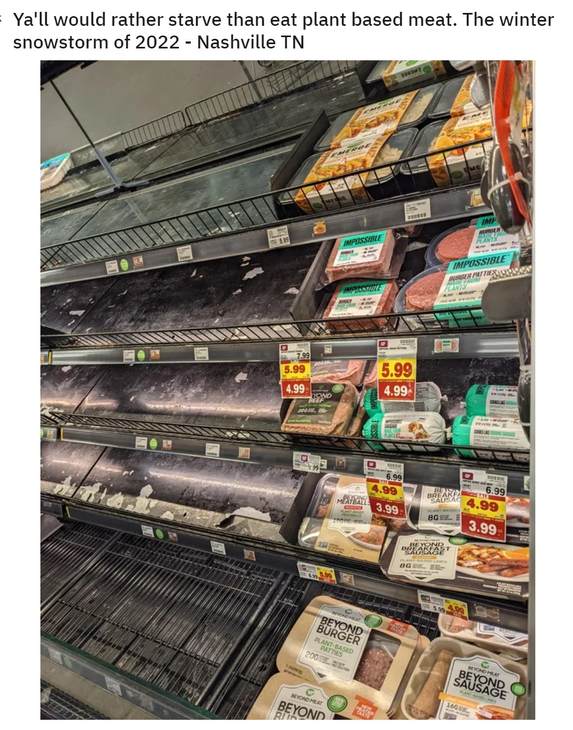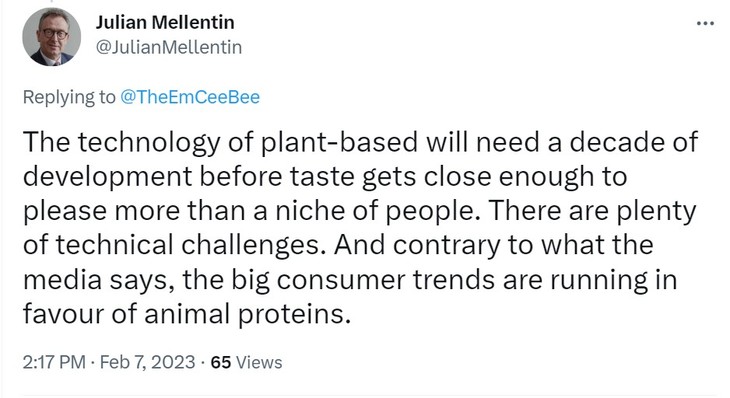Oh, for the halcyon days of, like, two years ago. When the mere mention of cow farts, with their deadly, targeted destruction of all we hold precious on Earth, was enough to move the perpetually guilt-ridden off their moo juice and meatloaf. Desperate to assuage their culpable consciences for their part in environmental collapse, they flocked to niche grocery stores and trendy Whole Foods-type chains to snap up the shaped, mashed-up concoctions of fats and gelatinous vegetable fibers that promised to replace Satan’s food stuff and be almost as tasty.
Greedy corporate titans rubbed their hands in WEF glee at how their machinations were all coming to fruition. Media worldwide, heavily invested in those same, pernicious Global Warming/Green fever dreams, applauded madly and did everything they could to further the burgeoning movement, lauding each and every advance in faux food as if Einstein himself had discovered it.
I CAN’T BELIEVE IT’S NOT MEAT!
After all – it’s just a tiny step from manipulated millet Manwich to a roasted roach reduction with endive, right?
They were sure they had us. Their almond milk, soy boy patty, and vegan egg omelet converts would proselytize worldwide. Peer pressure and lack of resources would force the rest of us into bugs.
Welp. A funny thing happened along the way to Phony Baloney World Domination.
No matter how brilliant the packaging, the voluminous research, and the rapturous accolades of an adoring dirty-hippie-at-heart press?
Most regular folks think it still tastes like crap.
The UK meat substitute market fell by 6.1% by value in 2022 and 9.3% by volume. Most brands experienced falling sales. Products fail to meet consumers' expectations of taste. What the media says about plant-based markets and what the reality is are far apart from one-another. pic.twitter.com/YLnPq4qihu
— Julian Mellentin (@JulianMellentin) February 6, 2023
You have to ask yourself a basic question: If meat is so awful, why is it imperative to make sure the faux meat tastes like meat?
There’s no answer for that, because there isn’t really any substitute for the real thing.
Not so long ago, alternative protein products like Beyond Meat and Impossible Burger promised to consign conventional beef, pork and chicken to the culinary dark ages. The companies’ stock prices soared, as did their market share. But consumers lost their appetite for fake meat in 2022, with the industry posting significant declines here in the US.
Divorcing Americans from their carnivorous habits has always been an uphill battle. For nearly two centuries, a colorful cast of eccentrics and entrepreneurs have pushed alternatives to meat only to see the real thing regain its place of pride on the nation’s tables. Until fake meat is indistinguishable from the real thing — and poses no ethical dilemmas — we’re unlikely to see a change.
[cue: sad trombone]
Even what are considered the “best,” most accessible brands are having a really hard time in the marketplace right now, and it’s no wonder.
Customers and investors alike are sticking a fork in fake meat.
…But now, the sector’s overall fortunes appear to be waning, with prominent industry names facing headwinds from a slowing economy, and a loss of buzz.
• Impossible Foods plans to lay off roughly 20% of its workforce, per a Bloomberg report. However, the company tells Axios that it saw record growth last year.
• Impossible’s primary competitor, Beyond Meat, also cut roughly 20% of its workers, and lost several executives, amid its own stock slump.
• Beyond Meat’s sales fell more than 22% in the third quarter of 2022 compared to 2021. In an Q3 earnings call, company executives blamed inflation for consumers’ souring tastes on pricier plant-based meats.
• Beyond Meat’s stock is down roughly 67% compared to a year ago.
For all the “tastes like meat” hype, and consumers willing to give it that shot just to see, and, well, no.
It doesn’t.

And, frankly, people are watching places like the Netherlands push their farmers off of land they’ve worked for generations in some instances, and seen Greens vilify dairy cows…and they’ve had enough. A phony baloney burger is just enough to drive them over the edge.
…“The category had been growing at double-digit for a long time and was expected to continue, but what we saw this year is that the number of consumers who were buying it did not increase,” said Justin Cook, the U.S. consumer products research leader at Deloitte.
While inflation played a role, so did a decline in the perception that plant-based meats are healthier than animal proteins. (The companies focus on the environmental benefits.) But the Deloitte analysts said another problem might be resistance to a product that some segment of customers see as “woke” and linked to politically left-leaning ideas.
In August, when the Cracker Barrel restaurant chain stated on its Facebook page that it had begun offering the meatless “Impossible Sausage,” the post was flooded with thousands of comments from irate customers.
“Go woke, go broke,” one wrote. “You just lost a ton of your base. You obviously don’t know your patrons.”
CRACKER BARREL did what?! I’d say that was a serious misstep. I’ve eaten there a couple of times over the years. I know enough not to get between the big guy at the table next to me as the waitress is handing him that extra bowl of sausage gravy (You’ll lose at least a finger.). And some woke corporate mah-roon put fake sausage on that menu? BWAHAhahaha!
I hope he’s looking for a new job at an appropriate venue, where they have his kind of people.
They will still be pouring money and time into researching the perfect fake, but the auguries are not shaking out favorably for them.

Don’t even get me started on what has to go into fake to make it. It’s like my argument against margarine decades ago – a paragraph of chemicals vs cream and salt. Hello.
I’ll be a natural food girl, thank you, and by that, I mean real meat, not molded.
By George, I think I’ve talked myself into one of hubby’s World Famous Cheeseburgers™ for dinner.
I’ll even do it as a protest against phony baloney. FOR THE PEOPLE!








Join the conversation as a VIP Member